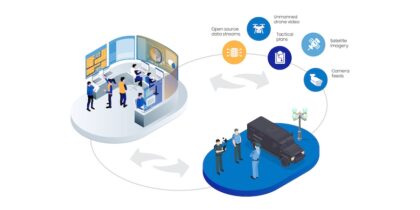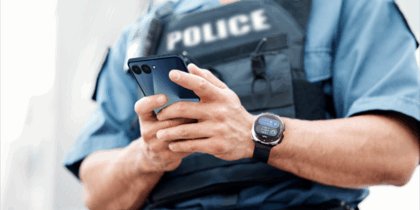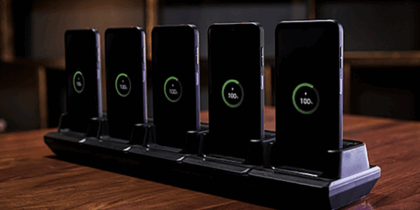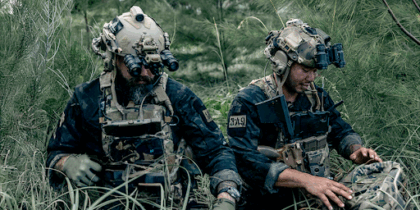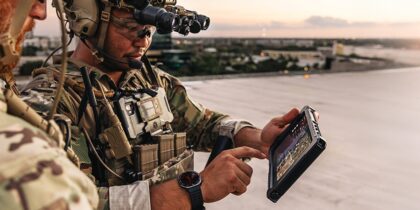Mobile devices have grown increasingly essential to government work, from facilitating tactical operations to supporting law enforcement investigations to handling routine administrative responsibilities. However, the need to manage risk remains a primary concern for government agencies and, in some cases, has led to bans and restrictions on smartphone usage for those working to support security-sensitive missions. While many mobile security concerns are the same as those traditionally associated with PCs, mobile devices’ persistent connectivity and highly distributed nature raise additional risks, especially for those likely to be targeted for surveillance and espionage. One primary concern is the threat of location tracking via a device’s radio frequency (RF) signals.
To address this risk, the Secure Spaces solution from Samsung and Privoro provides high-assurance control over a Samsung Galaxy smartphone’s radio signals, as well as its camera and microphone, whether a user is in a classified space or out in the field supporting tactical or other sensitive operations.1 This unique signature management capability enforceably disables a mobile device’s cellular radio to protect users from compromise via RF tracking.
RF tracking is a significant concern for security-sensitive government operations
Smartphones use peripheral devices to connect to a wide range of networks via RF signals, such as WiFi, Bluetooth, GPS and NFC Field Communication (NFC). By emitting radio signals, mobile devices can inadvertently reveal sensitive locations, user work patterns or other valuable surveillance data. As a result, agencies that prioritize operational secrecy often ban or restrict mobile phone use for select field and tactical operations or in high-security locations.
For the everyday user, manually turning off network connectivity can reduce the possibility of being compromised through RF tracking should such a need arise. However, for those with high-security needs, this is far from sufficient. First, it relies on users to do the right thing. As with other security controls that require user action, this introduces a higher possibility for compromise due to intentional or unintentional failure to follow security policy. Second, when a user manually turns their phone’s network connections off, for example by going into airplane mode, sophisticated signals tracking can flag such an activity as “interesting” or “suspicious.” This can prompt further investigation to gather useful information about where and when the user “went dark.” Finally, sophisticated malware can take control of peripherals via operating system (OS) compromise, turning radio signals on without a user even knowing.
High-assurance radio control helps agencies confidently mitigate RF tracking risks
To address the need to remain connected to critical mission communications and data without risking compromise, Samsung and Privoro offer a Secure Spaces solution with a unique signature management capability that provides high-assurance control over the radios, sensors and other hardware peripherals within select models of Samsung Galaxy smartphones. These hardware-based controls prevent adversaries from tracking user movements in the field using common electronic warfare (EW) tactics, including signals intelligence (SIGINT) collection and RF-based geolocation. As part of an emission control (EMCON) strategy, it provides critical protection for agencies conducting highly sensitive missions. Here is how it works:
- Samsung’s unique Hardware Device Manager (HDM) provides chip-level control of a phone’s usage of cellular radio, NFC, Bluetooth and Wi-Fi. This Samsung-exclusive security layer works in isolation from the OS and maintains hardware-backed control over the device’s peripherals — even if the OS is compromised.
- Privoro provides SafeCase, a specialized, high-security device designed as a discrete phone case. It mitigates the risks of spyware-enabled phone surveillance through physical camera protections and audio masking while also ensuring that policies impacting cellular connectivity via Knox HDM peripheral controls are strictly maintained and enforced.
- When used together, the integrated Samsung HDM and Privoro SafeCase leverage two different hardware systems that are isolated from one another and enforce device policy at a hardware level below the operating system (OS). This means there is no single point of failure and that vulnerabilities introduced in the app and OS layers cannot be used to bypass security policy enforcement and take control of the phone’s peripheral devices.
Redefine “covert” with advanced signals blocking and high-assurance radio control
With the Secure Spaces solution and signature management, users can “go dark” on their cellular network via the same hardware-based controls. This is a critical capability for tactical and other types of sensitive or covert field operations. The cell signal appears to have dropped off as if the user has gone underground, making it much less likely to draw unwanted attention than a user switching to airplane mode. Because this action does not involve the OS, it cannot be detected by malicious spyware should the OS be compromised.
Beyond RF tracking: sophisticated malware threats can leverage radio signals
While the risk of RF tracking is one of the more common concerns driving interest in high-assurance control over a phone’s radio signals, another relevant threat is the emergence of attacks that can deliver malicious code to a device when it connects to a compromised radio tower. This type of attack can be especially dangerous because it requires no user action to compromise the device and is nearly undetectable. Eliminating vulnerability to attacks that leverage cellular infrastructure in this way requires the ability to enforceably turn off a mobile device’s radio signals. For those with specialized security requirements, the Secure Spaces solution from Samsung and Privoro is significantly helpful under certain conditions, such as when operating in an area where cell tower compromise is suspected or for a duration of time when such an attack could be most damaging.
When operational secrecy matters, high-assurance radio control is essential
For some government mission sets, maintaining secrecy of operations is paramount. While smartphones offer essential capabilities, they can also pose a surveillance risk. Whether in the field or in a classified space, the trusted use of smartphones for security-sensitive missions requires confidence that the devices cannot expose vital operational data through signals tracking. For truly covert usage, avoiding surveillance takes more than a simple user action to turn on airplane mode or power down the device. Samsung and Privoro meet that need with high assurance, enforceable radio signal control built in from the chip up and backed by hardware-based policy enforcement.
Learn more about Samsung government mobility solutions.
1HDM was originally developed for us with the Samsung Galaxy S22 series smartphone and is now available for the Galaxy S23 series, with support coming for the S24 series in 2025.

